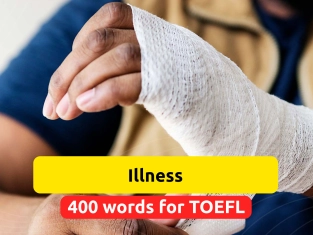by PushtoLearn
Surgery
Table of Contents
Surgery Flashcards - Vocabulary Practice for TOEFL
These exercises focus on Surgery Vocabulary
List of Surgery Words for the TOEFL
|
Word |
Definition |
Example |
|
Anesthesia |
A medically induced state of insensitivity to pain. |
The patient was given anesthesia before the operation. |
|
Augment |
To increase or enhance something. |
Cosmetic surgery is often performed to augment facial features. |
|
Certifiably |
In a manner that can be officially recognized or proven. |
The hospital is certifiably equipped to perform complex surgeries. |
|
Complication |
A secondary problem arising from a procedure or condition. |
Post-surgery complications delayed her recovery. |
|
Cure |
To restore health by treating a disease or condition. |
The surgery is expected to cure the patient’s heart defect. |
|
Implant |
A medical device or material placed inside the body. |
The dentist placed a dental implant to replace the missing tooth. |
|
Inject |
To introduce a substance into the body with a syringe. |
The nurse had to inject the patient with a painkiller. |
|
Obese |
Extremely overweight in a way that may harm health. |
The patient underwent weight-loss surgery because they were obese. |
|
Procedure |
A series of actions conducted to achieve a medical goal. |
The surgical procedure lasted three hours. |
|
Scar |
A mark left on the skin after a wound or surgery heals. |
The surgeon explained that the procedure would leave a small scar. |

Usage in TOEFL Exam Formats
Reading Section
-
Words like anesthesia, implant, and procedure often appear in passages discussing medical technology or health advancements.
-
Example Question: What does the passage suggest about the benefits of using anesthesia?
Listening Section
-
Terms such as complication, inject, and scar are commonly used in lectures or discussions on medical practices.
-
Example: “Injecting medication is a common step in many surgical procedures.”
Writing Section
-
Use terms like augment, certifiably, and cure to demonstrate advanced vocabulary in essays.
-
Example Sentence: “Advanced surgical procedures can augment recovery rates and certifiably reduce complications.”
Speaking Section
-
Employ words like obese, procedure, or implant to articulate ideas clearly during speaking tasks.
-
Example: “Surgeries for obese patients often involve procedures to reduce stomach size.”
Common Mistakes
-
Confusing "Anesthesia" with "Sedation":
-
Mistake: "The patient was under sedation for the entire surgery."
-
Correction: "The patient was under anesthesia for the entire surgery."
-
Misusing "Augment" in Contexts Without Improvement:
-
Mistake: "The surgery augmented her pain."
-
Correction: "The surgery augmented her facial structure."
-
Misapplying "Certifiably" in Non-Official Contexts:
-
Mistake: "The meal was certifiably delicious."
-
Correction: "The hospital is certifiably capable of handling emergencies."
-
Overgeneralizing "Complication":
-
Mistake: "The test caused complications in understanding the topic."
-
Correction: "The surgery caused complications that required additional care."
-
Confusing "Procedure" with "Process":
-
Mistake: "The dentist explained the cleaning process in detail."
-
Correction: "The dentist explained the cleaning procedure in detail."
FAQ
What does "anesthesia" mean in medical contexts?
"Anesthesia" refers to a medically induced loss of sensation or awareness to prevent pain during surgery.
How is "augment" used in surgical discussions?
"Augment" means to enhance or improve, such as augmenting features through cosmetic surgery.
What’s the difference between "procedure" and "process"?
"Procedure" refers to a specific, structured series of steps in a medical context, while "process" is more general and not limited to medical settings.
Can "scar" refer to something other than physical marks?
Yes, "scar" can also refer to emotional or psychological marks left after traumatic events, though the physical meaning is more common in medical contexts.
Why is "complication" important in surgery discussions?
"Complication" describes unexpected issues that arise during or after surgery, crucial in assessing medical risks and outcomes.

